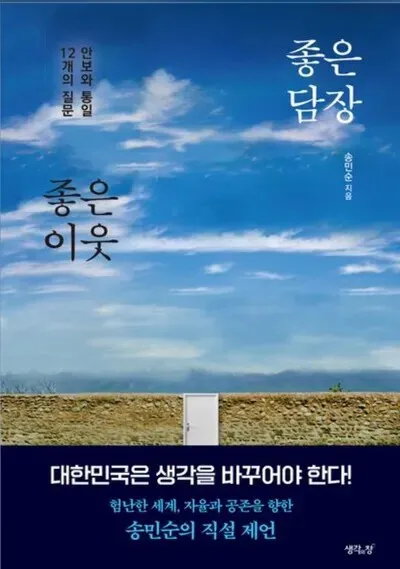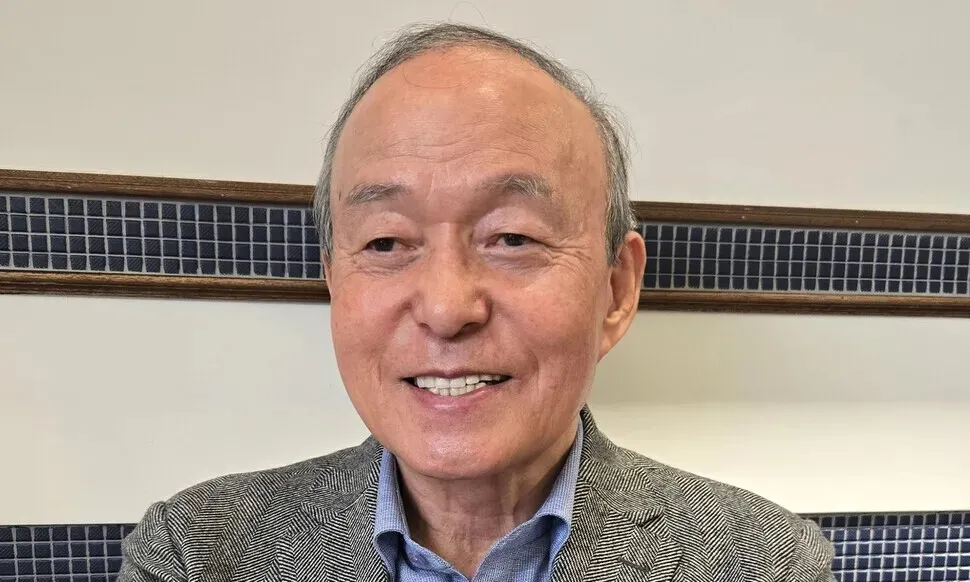Tune Min-soon, who served as Korea’s minister of overseas affairs and commerce underneath President Roh Moo-hyun from 2006-2008, speaks to the Hankyoreh. (Lee Je-hun/Hankyoreh)
Calling the notion of attaining full denuclearization of the Korean Peninsula via negotiations an “unattainable pipe dream,” veteran South Korean diplomat and former overseas minister Tune Min-soon predicted that there will likely be “two very totally different, separate states” on the peninsula for the foreseeable future.
“South Korea ought to take a unique stance completely when addressing North Korea, which possesses nuclear capabilities. We should always, for now, shelf the dream of unification,” Tune argues.
The thought is that Seoul would do effectively to overlook about unification and denuclearization in the intervening time — a controversial take that challenges conventional traces of thought.
Whereas Tune will not be the primary to undertake such a place, his resume actually provides weight to his phrases.
Tune remained on the forefront of South Korean diplomacy for 34 years, from the second he entered the Ministry of International Affairs in 1975 till he retired from his put up as overseas minister in February 2008.
He laid the groundwork for the South Korea-US alliance of right now by heading negotiations for the modification of the Standing of Forces Settlement (SOFA) and negotiating the South Korea-US navy burden-sharing deal. He had a key position in shaping the Sept. 19 Joint Assertion that got here out of the six-party talks in 2005 — a doc lauded as a blueprint for post-Chilly Battle Northeast Asia.
The truth that Tune sketched the plan to realize denuclearization and peace on the Korean Peninsula within the first place lends plain weight to his argument that Seoul ought to cease prioritizing unification and denuclearization.
Tune had loads to say throughout an interview with the Hankyoreh relating to the discharge of his new e-book, “Good Fences, Good Neighbors,” revealed by the Window of Thought, after I met him at his private workplace positioned within the foothills of Mount Nam on Oct. 29. Within the two hours we spent collectively going from restaurant to espresso store, he shared what’s been on his thoughts of late.
“Good Fences, Good Neighbors” is Tune’s first e-book in 9 years, following his 2016 memoir, “Glaciers Transfer,” revealed by Changbi. If “Glaciers Transfer” is a report on the previous, a disclosure akin to a company finance report of the experiences and considerations collected over 34 years of public service funded by taxpayers, “Good Fences, Good Neighbors” is a immediate meant to mild the way in which for South Korean society going ahead.
Trustworthy to the e-book’s subtitle, “12 questions on safety and unification,” Tune chosen a dozen questions he believes are important for charting the long run course of South Korea, presenting a summarized model of his opinions, chosen from years of analysis and reflection, as a catalyst for debates on “the nationwide aspiration for peace, prosperity and unification.”
The title of the e-book comes from a Robert Frost poem written throughout World Battle I, “Good fences make good neighbors,” and Tune repeatedly emphasised that stability, slightly than peace, is essential to present South Korean society.

The quilt of Tune’s new e-book “Good Fences, Good Neighbors.”
If South Korea is to coexist with neighboring international locations with out stoking battle or confrontation, it mustn’t try and open its doorways to everybody, however slightly construct good fences. The “strategic autonomy of nationwide coverage” can solely be expanded via good fences, which in flip will enable South Korea to have good neighbors, together with North Korea. His argument that we must always take into account North Korea as a neighbor slightly than a compatriot comes with its personal set of issues.
Tune reached this conclusion from his understanding that the North Korea drawback has essentially modified. “North Korea emerged as a nuclear energy in 2017 following its profitable take a look at launch of the Hwasong-15 intercontinental ballistic missile,” he stated.
That second when North Korea began to own nuclear weapons marked a elementary shift on the Korean Peninsula, a change akin to the second Adam and Eve bit into the forbidden fruit of data. Tune opines that North Korea’s nuclear capabilities ought to now not be thought of a variable, however a relentless. There’s a snowball’s probability in hell that North Korea will voluntarily abandon its nuclear weapons, in keeping with Tune.
He believes that the trail of “heat,” energetic peace — one which follows the steps of trade, denuclearization, peace and reunification and has been pursued by successive South Korean governments over the previous 30 years because the finish of the Chilly Battle — has hit a useless finish.
As such, it’s now time for a “chilly,” passive peace — one which acknowledges the truth of division, the steadiness of energy, and stability and coexistence. In different phrases, Tune means that we must always proceed our place of mixing deterrence and containment in opposition to North Korea whereas concurrently pursuing to discount in tensions and mitigating dangers.
“Counting on the steadiness between the US and North Korea’s nuclear capabilities is a safety technique so fragile, it’s very like a lone piece of fruit dangling precariously on a department,” Tune acknowledged. “So long as North Korea makes use of nuclear weapons as political leverage, South Korea will all the time cower earlier than the US.”
To make issues worse, the US, which South Korea closely relies on for nationwide safety, is championing American isolationism by declaring that it’ll prioritize the protection of its homeland. Tune believes that it’s unattainable to foretell when the US would possibly withdraw the nuclear umbrella it has prolonged over South Korea, or when the price of that nuclear umbrella might skyrocket to unimaginable, unaffordable heights.
Tune’s principal proposal is that South Korea ought to pivot to changing into a rustic with nuclear latency. Nuclear latency refers to a rustic that “already possesses the fundamental parts essential to manufacture nuclear weapons whereas adhering to the Nuclear Non-Proliferation Treaty (NPT), and will purchase nuclear weapons in a brief interval if it wishes to take action,” in keeping with Tune. Japan and Germany, international locations that would doubtlessly produce nuclear weapons inside six months as a consequence of the truth that they’ve accomplished their nuclear gasoline cycles, could be described as “latent” nuclear powers.
Setting on a brand new course to achieve nuclear latency is the important thing to making sure the “strategic autonomy of nationwide coverage” with out being overtaken by the merciless new world engulfing the Korean Peninsula — a world through which everybody should fend for themselves.
By this objective, Tune believes in redefining the South Korea-US alliance as one the place each events are impartial, as an alternative of 1 being extra reliant on the opposite. In the case of North Korea, South Korea ought to have in mind Kissinger’s détente coverage, which includes experiencing a strategy of “coexistence and deterrence” to succeed in a stage through which power determines who wins or loses.
That is the rationale Tune proposes that we tackle North Korea as a neighbor as an alternative of a compatriot, and acknowledge unification as a “potential final result” slightly than a objective that should be achieved. As soon as the South Korea-US alliance turns into one that’s extra impartial, South Korea ought to retake wartime operational management from the US.
Tune has spent three excruciating years, ranging from October 2022, placing pen to paper. His new publication is the fruit of such labor. Within the introduction to his e-book, Tune writes, “I’ve no alternative however to consider that that is the easiest way ahead, contemplating the circumstances given to us now and what we anticipate within the far future.” It’s now time for us to interact in debate.
By Lee Je-hun, senior employees author; Kang Sung-man, senior employees author
Please direct questions or feedback to [english@hani.co.kr]

